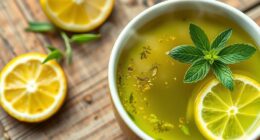Did you know that 92% of people believe that a bright smile is an important social asset? We all want to maintain white, healthy teeth, but there are many factors that can contribute to teeth discoloration.
One such factor that has gained attention in recent years is turmeric. Turmeric, a spice commonly used in cooking and traditional medicine, has been praised for its numerous health benefits. However, some people have raised concerns that turmeric can stain teeth and make them yellow.
In this article, we will explore the scientific evidence behind this claim and determine whether turmeric is indeed a culprit for teeth discoloration. We will also discuss the potential oral health benefits of turmeric and provide tips on how to prevent teeth staining from turmeric.
So, let’s dive in and separate fact from fiction when it comes to turmeric and its impact on the color of your teeth.
Key Takeaways
- Turmeric can cause yellow staining on teeth due to its pigmented substance called curcumin.
- Excessive consumption of turmeric can lead to temporary yellow discoloration of teeth.
- Proper oral hygiene, such as brushing immediately after consuming turmeric, can prevent staining.
- Using natural teeth whitening products and incorporating turmeric in moderation can help remove surface stains and brighten teeth.
The Staining Potential of Turmeric
Did you know that turmeric, the vibrant yellow spice often used in cooking, has the potential to leave your teeth with an unsightly yellow stain? While turmeric is known for its health benefits and is even used in some toothpaste formulas for its natural teeth whitening properties, it can also have the opposite effect on your pearly whites.
The strong pigments in turmeric can easily adhere to the enamel of your teeth, causing them to take on a yellowish hue over time. This staining potential is something to consider if you regularly consume turmeric or use turmeric toothpaste.
Understanding the science behind teeth discoloration can help you make informed decisions about your dental care.
The Science Behind Teeth Discoloration
The natural pigments found in certain substances can lead to a vibrant alteration in the shade of our pearly whites. When it comes to teeth discoloration, there are various factors at play.
Teeth can become discolored due to extrinsic staining, which occurs on the surface of the tooth, and intrinsic staining, which happens within the tooth structure. Extrinsic staining is often caused by the consumption of pigmented substances, such as coffee, tea, and red wine, as well as tobacco use. While turmeric is known for its staining potential, it’s important to note that it’s not the only culprit.
There are many natural remedies for teeth whitening, but it’s crucial to understand their effects on tooth color. Now, let’s delve into the role of turmeric in staining teeth.
The Role of Turmeric in Staining Teeth
Imagine yourself enjoying a warm, flavorful curry, unaware of the surprising effect it can have on the brightness of your smile. Turmeric, a spice commonly used in curries and known for its vibrant yellow color, has been found to have staining properties that can discolor teeth. The active compound in turmeric, called curcumin, is highly pigmented and can adhere to the enamel of your teeth, resulting in a yellowish tint. While turmeric may have some potential benefits for oral health, such as its anti-inflammatory and antimicrobial properties, it is important to be aware of its potential to stain teeth. Fortunately, there are ways to mitigate the staining effects of turmeric, such as brushing your teeth immediately after consuming turmeric-containing foods or using whitening toothpaste. However, it is essential to consider other factors that contribute to teeth discoloration, such as smoking or certain medications.
Other Factors That Contribute to Teeth Discoloration
When indulging in certain habits like smoking or taking specific medications, it’s like a shadow slowly creeping over the brightness of your smile. However, it’s important to note that turmeric isn’t the only culprit when it comes to teeth discoloration. There are other factors that can contribute to the staining of teeth. Here are five examples:
- Foods that stain teeth, such as coffee, tea, red wine, and berries.
- Poor oral hygiene practices, including inadequate brushing and flossing.
- Aging, as the enamel naturally thins over time, making the dentin underneath more visible.
- Trauma or injury to the teeth, which can cause the dentin to darken.
- Certain medications, such as tetracycline antibiotics, which can cause intrinsic staining.
While turmeric can contribute to teeth discoloration, it’s just one piece of the puzzle.
Now, let’s explore the benefits of turmeric for oral health.
The Benefits of Turmeric for Oral Health
One often overlooked aspect of maintaining good oral health is the potential positive impact that turmeric can have. Turmeric, a vibrant yellow spice commonly used in cooking, has been found to possess several benefits for oral health. Its natural anti-inflammatory and antimicrobial properties make it an excellent ingredient for oral care products such as turmeric mouthwash and turmeric toothpaste.
Turmeric’s active compound, curcumin, has been shown to help reduce inflammation and fight against harmful bacteria in the mouth. Additionally, turmeric can help promote gum health by reducing plaque buildup and preventing gingivitis. Incorporating turmeric into your oral care routine can be a great way to improve overall oral health.
Moving forward, let’s explore some tips for preventing teeth discoloration from turmeric.
Tips for Preventing Teeth Discoloration from Turmeric
Now that we know about the benefits of turmeric for oral health, it’s important to also address the potential issue of teeth discoloration that can occur from using turmeric. Fortunately, there are some simple tips that can help prevent stains and keep your teeth looking white and bright.
Here are four strategies for preventing teeth discoloration from turmeric:
-
Brush your teeth immediately after consuming turmeric to remove any residue that may cause staining.
-
Rinse your mouth with water after consuming turmeric to minimize its contact with your teeth.
-
Use a straw when consuming turmeric-infused drinks to minimize direct contact with your teeth.
-
Consider using a natural teeth whitening toothpaste or mouthwash to help counteract any potential staining.
By following these tips, you can enjoy the benefits of turmeric for oral health while minimizing the risk of teeth discoloration.
In the next section, we’ll discuss the verdict on turmeric and teeth yellowing.
Conclusion: The Verdict on Turmeric and Teeth Yellowing
To sum up, the overall outcome of using turmeric for oral health is a bright and vibrant smile. While it is true that turmeric has a yellow pigment that can potentially stain teeth, the evidence suggests that when used in moderation and with proper oral hygiene practices, turmeric can actually help whiten teeth. Turmeric contains a compound called curcumin, which has antibacterial and anti-inflammatory properties that can promote gum health and reduce plaque buildup. Additionally, turmeric can act as a natural teeth whitener by removing surface stains and brightening the overall appearance of the teeth. It is important to note that excessive consumption or prolonged use of turmeric may lead to temporary yellow staining, but this can easily be prevented by practicing good oral hygiene and limiting the amount of turmeric used. Overall, turmeric can be a beneficial addition to your oral care routine, offering both oral health benefits and teeth whitening properties.
| Turmeric Teeth Whitening | Turmeric Teeth Staining |
|---|---|
| Removes surface stains | Excessive consumption |
| Promotes gum health | Prolonged use |
| Brightens overall appearance | Temporary yellow staining |
| Offers oral health benefits |
Frequently Asked Questions
How long does it take for turmeric to stain teeth?
I investigated the truth about how long it takes for turmeric to stain teeth. Turmeric stains can be removed using baking soda or hydrogen peroxide. Although turmeric staining is not harmful to dental health, it can be unsightly.
Can turmeric stains on teeth be removed or lightened?
Yes, turmeric stains on teeth can be removed or lightened. There are natural teeth whitening options available, such as brushing with baking soda or using hydrogen peroxide. These methods can help eliminate turmeric stains and restore the whiteness of your teeth.
Is turmeric the only food or spice that can stain teeth?
Various foods and spices can cause tooth discoloration, not just turmeric. To prevent staining, practice good oral hygiene, limit consumption of staining foods like coffee and red wine, and consider using a straw when drinking beverages that can stain teeth.
Are there any health benefits to consuming turmeric despite the potential teeth staining?
There are numerous health benefits associated with consuming turmeric. It has anti-inflammatory properties, aids in digestion, improves brain function, boosts immunity, and may even help prevent cancer and heart disease.
Can turmeric staining be prevented by consuming it in a different form, such as in supplements or capsules?
To prevent turmeric staining, consider consuming it in alternative forms like supplements or capsules. These options allow you to enjoy the health benefits of turmeric without worrying about teeth discoloration.
Conclusion
In conclusion, it’s important to consider the potential staining effects of turmeric on teeth. While turmeric has been praised for its numerous health benefits, it can also contribute to teeth discoloration. However, with proper oral hygiene and regular dental care, this issue can be managed. It’s advisable to take precautions, such as rinsing the mouth after consuming turmeric and maintaining good dental habits. Ultimately, the decision to incorporate turmeric into one’s diet should be made with awareness and understanding of its potential impact on teeth color.










